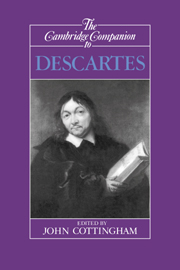Book contents
- Frontmatter
- Introduction
- 1 Descartes' life and the development of his philosophy
- 2 Descartes and scholasticism
- 3 The nature of abstract reasoning
- 4 Cartesian metaphysics and the role of the simple natures
- 5 The Cogito and its importance
- 6 The idea of God and the proofs of his existence
- 7 The Cartesian circle
- 8 Cartesian dualism
- 9 Descartes' philosophy of science and the scientific revolution
- 10 Descartes' physics
- 11 Descartes' physiology and its relation to his psychology
- 12 Descartes on thinking with the body
- 13 The reception of Descartes' philosophy
- Bibliography
- Index
13 - The reception of Descartes' philosophy
Published online by Cambridge University Press: 28 May 2006
- Frontmatter
- Introduction
- 1 Descartes' life and the development of his philosophy
- 2 Descartes and scholasticism
- 3 The nature of abstract reasoning
- 4 Cartesian metaphysics and the role of the simple natures
- 5 The Cogito and its importance
- 6 The idea of God and the proofs of his existence
- 7 The Cartesian circle
- 8 Cartesian dualism
- 9 Descartes' philosophy of science and the scientific revolution
- 10 Descartes' physics
- 11 Descartes' physiology and its relation to his psychology
- 12 Descartes on thinking with the body
- 13 The reception of Descartes' philosophy
- Bibliography
- Index
Summary
At the height of his enthusiasm for Locke, Voltaire delivered a characteristically witty verdict on his great compatriot:
'Our Descartes, born to uncover the errors of antiquity, but to substitute his own, and spurred on by that systematizing mind which blinds the greatest of men, imagined that he had demonstrated that the soul was the same thing as thought, just as matter, for him, is the same thing as space. He affirmed that we think all the time, and that the soul comes into the body already endowed with all the metaphysical notions, knowing God, space, the infinite, having all the abstract ideas, full, in fact, of learning which unfortunately it forgets on leaving its mother's womb.'
Voltaire’s portrait of Descartes is instantly recognizable today; indeed his estimate of Descartes is one on which many of us have been brought up, especially in the English-speaking world. Descartes is the father of modern philosophy, but he was led astray by his passion for system; he tried to derive factual truths about the world from principles that are supposedly known a priori. In short, although, Voltaire does not use the term, his Descartes is very much a rationalist. Moreover, like many modern readers, Voltaire tends to associate Descartes primarily with a distinctive set of doctrines in the philosophy of mind.
- Type
- Chapter
- Information
- The Cambridge Companion to Descartes , pp. 393 - 423Publisher: Cambridge University PressPrint publication year: 1992
- 23
- Cited by



